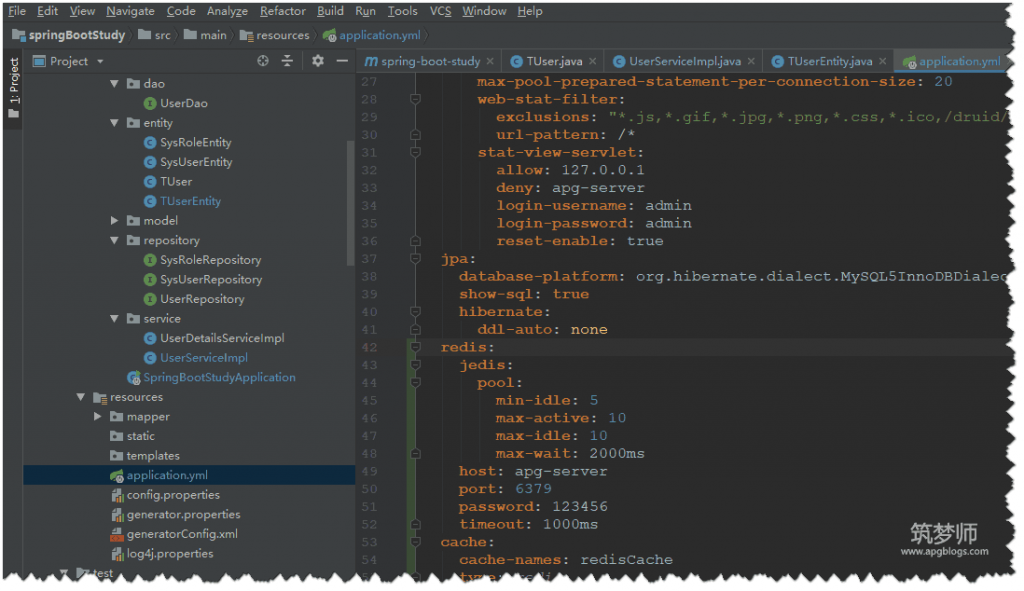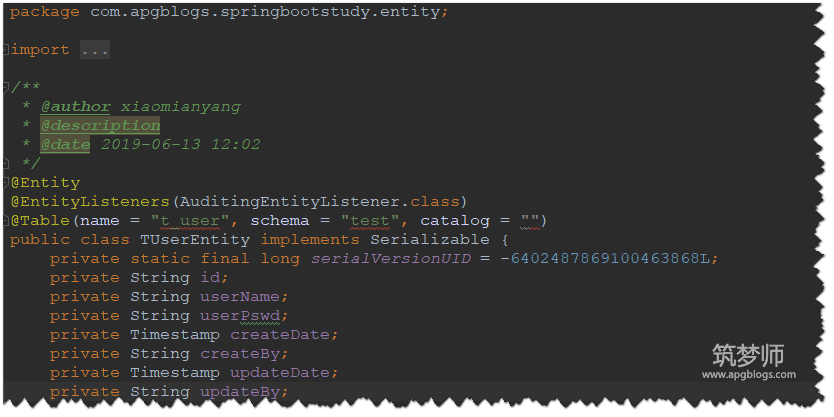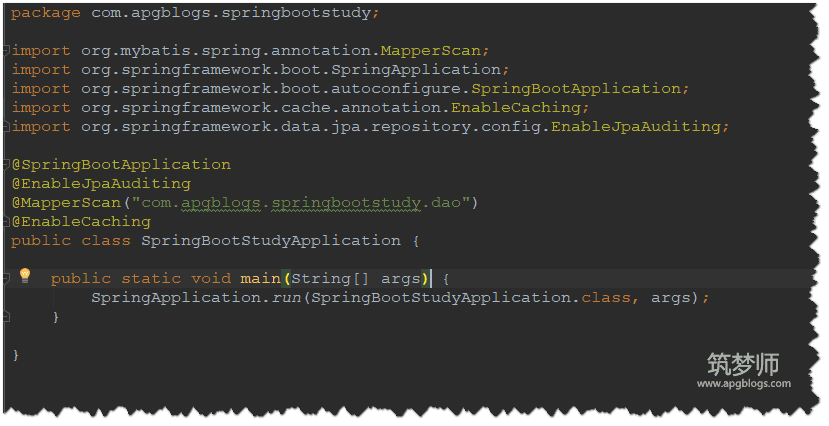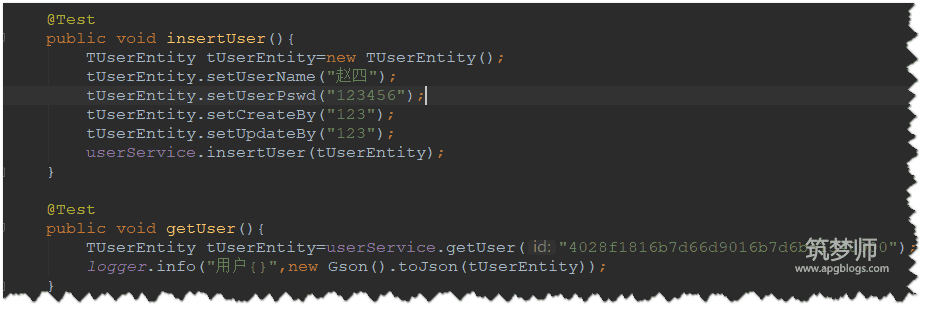redis的缓存性能是非常强的,而且功能也很强大,也是项目考虑上缓存的首选,这一节主要讲述如何在springboot中集成redis并操作缓存,springboot对于redis的集成也比较方便,spring data也提供了对redis的操作,而且只使用注解的方式就可以很方便的操作redis
1、在pom中添加redis缓存支持依赖 <!-- redis集成 -->
<dependency>
<groupId>org.springframework.boot</groupId>
<artifactId>spring-boot-starter-data-redis</artifactId>
</dependency> <!-- redis集成 --> <dependency > <groupId > org.springframework.boot </groupId> <artifactId > spring-boot-starter-data-redis </artifactId> </dependency> <!-- redis集成 -->
<dependency>
<groupId>org.springframework.boot</groupId>
<artifactId>spring-boot-starter-data-redis</artifactId>
</dependency> 2、修改配置文件添加redis连接设置 只需要看追加的redis和cache部分,其他的跟之前是一样的
3、修改TUserEntity类,实现序列化接口 实现序列化接口是为了序列化和反序列化当前类
就是将当前实体类以二进制的方式存取,这样就可以存入到redis中了serialVersionUID 是为了保证类的序列化和反序列化时有一个唯一ID 4、在UserServiceImpl类中添加缓存注解 这里就是重点了,这些注解就很方便的对我们的数据进行了缓存
@Cacheable 根据请求参数缓存 package com.apgblogs.springbootstudy.service;
import com.apgblogs.springbootstudy.base.BaseService;
import com.apgblogs.springbootstudy.dao.UserDao;
import com.apgblogs.springbootstudy.entity.TUser;
import com.apgblogs.springbootstudy.entity.TUserEntity;
import com.apgblogs.springbootstudy.repository.UserRepository;
import org.springframework.beans.factory.annotation.Autowired;
import org.springframework.cache.annotation.CacheEvict;
import org.springframework.cache.annotation.CachePut;
import org.springframework.cache.annotation.Cacheable;
import org.springframework.stereotype.Service;
import org.springframework.transaction.annotation.Transactional;
import java.util.List;
/**
* @author xiaomianyang
* @description
* @date 2019-06-13 10:35
*/
@Service
public class UserServiceImpl extends BaseService<UserDao, TUser> {
@Autowired
private UserRepository userRepository;
/**
* @description 查询所有用户
* @author xiaomianyang
* @date 2019-06-13 10:37
* @param []
* @return java.util.List<TUserEntity>
*/
public List<TUserEntity> getUserList(){
return userRepository.findAll();
}
/**
* @description 查询单个用户
* @author xiaomianyang
* @date 2019-06-13 10:39
* @param [id]
* @return TUserEntity
*/
@Cacheable(value="redisCache",condition = "#result!='null'",key="'redis_user_'+#id")
public TUserEntity getUser(String id){
if(!userRepository.existsById(id)){
return null;
}
return userRepository.findById(id).get();
}
/**
* @description 创建用户
* @author xiaomianyang
* @date 2019-06-13 10:45
* @param [tUserEntity]
* @return TUserEntity
*/
@CachePut(value="redisCache",key="'redis_user_'+#result.id")
public TUserEntity insertUser(TUserEntity tUserEntity){
tUserEntity.setCreateBy("sys");
tUserEntity.setUpdateBy("sys");
return userRepository.save(tUserEntity);
}
/**
* @description 修改用户
* @author xiaomianyang
* @date 2019-06-13 10:40
* @param [tUserEntity]
* @return TUserEntity
*/
@CachePut(value="redisCache",condition = "#result!='null'",key="'redis_user_'+#tUserEntity.id")
public TUserEntity updateUser(TUserEntity tUserEntity){
TUserEntity tUserEntity1=userRepository.findById(tUserEntity.getId()).get();
if(tUserEntity1==null){
return null;
}
tUserEntity1.setUserName(tUserEntity.getUserName());
tUserEntity1.setUserPswd(tUserEntity.getUserPswd());
return userRepository.save(tUserEntity1);
}
/**
* @description 删除用户
* @author xiaomianyang
* @date 2019-06-13 10:44
* @param [id]
* @return void
*/
@CacheEvict(value = "redisCache",key="'redis_user_'+#id",beforeInvocation = false)
public boolean deleteUser(String id){
try{
userRepository.deleteById(id);
}catch(Exception e){
e.printStackTrace();
return false;
}
return true;
}
}
package com. apgblogs . springbootstudy . service ; import com. apgblogs . springbootstudy . base . BaseService ; import com. apgblogs . springbootstudy . dao . UserDao ; import com. apgblogs . springbootstudy . entity . TUser ; import com. apgblogs . springbootstudy . entity . TUserEntity ; import com. apgblogs . springbootstudy . repository . UserRepository ; import org. springframework . beans . factory . annotation . Autowired ; import org. springframework . cache . annotation . CacheEvict ; import org. springframework . cache . annotation . CachePut ; import org. springframework . cache . annotation . Cacheable ; import org. springframework . stereotype . Service ; import org. springframework . transaction . annotation . Transactional ; import java. util . List ; /** * @author xiaomianyang * @description * @date 2019-06-13 10:35 */ @Service public class UserServiceImpl extends BaseService<UserDao, TUser> { @Autowired private UserRepository userRepository; /** * @description 查询所有用户 * @author xiaomianyang * @date 2019-06-13 10:37 * @param [] * @return java.util.List<TUserEntity> */ public List<TUserEntity> getUserList ( ) { return userRepository. findAll ( ) ; } /** * @description 查询单个用户 * @author xiaomianyang * @date 2019-06-13 10:39 * @param [id] * @return TUserEntity */ @Cacheable ( value= "redisCache" ,condition = "#result!='null'" ,key= "'redis_user_'+#id" ) public TUserEntity getUser ( String id ) { if ( !userRepository. existsById ( id ) ) { return null; } return userRepository. findById ( id ) . get ( ) ; } /** * @description 创建用户 * @author xiaomianyang * @date 2019-06-13 10:45 * @param [tUserEntity] * @return TUserEntity */ @CachePut ( value= "redisCache" ,key= "'redis_user_'+#result.id" ) public TUserEntity insertUser ( TUserEntity tUserEntity ) { tUserEntity. setCreateBy ( "sys" ) ; tUserEntity. setUpdateBy ( "sys" ) ; return userRepository. save ( tUserEntity ) ; } /** * @description 修改用户 * @author xiaomianyang * @date 2019-06-13 10:40 * @param [tUserEntity] * @return TUserEntity */ @CachePut ( value= "redisCache" ,condition = "#result!='null'" ,key= "'redis_user_'+#tUserEntity.id" ) public TUserEntity updateUser ( TUserEntity tUserEntity ) { TUserEntity tUserEntity1=userRepository. findById ( tUserEntity. getId ( ) ) . get ( ) ; if ( tUserEntity1==null ) { return null; } tUserEntity1. setUserName ( tUserEntity. getUserName ( ) ) ; tUserEntity1. setUserPswd ( tUserEntity. getUserPswd ( ) ) ; return userRepository. save ( tUserEntity1 ) ; } /** * @description 删除用户 * @author xiaomianyang * @date 2019-06-13 10:44 * @param [id] * @return void */ @CacheEvict ( value = "redisCache" ,key= "'redis_user_'+#id" ,beforeInvocation = false ) public boolean deleteUser ( String id ) { try { userRepository. deleteById ( id ) ; } catch ( Exception e ) { e. printStackTrace ( ) ; return false; } return true; } } package com.apgblogs.springbootstudy.service;
import com.apgblogs.springbootstudy.base.BaseService;
import com.apgblogs.springbootstudy.dao.UserDao;
import com.apgblogs.springbootstudy.entity.TUser;
import com.apgblogs.springbootstudy.entity.TUserEntity;
import com.apgblogs.springbootstudy.repository.UserRepository;
import org.springframework.beans.factory.annotation.Autowired;
import org.springframework.cache.annotation.CacheEvict;
import org.springframework.cache.annotation.CachePut;
import org.springframework.cache.annotation.Cacheable;
import org.springframework.stereotype.Service;
import org.springframework.transaction.annotation.Transactional;
import java.util.List;
/**
* @author xiaomianyang
* @description
* @date 2019-06-13 10:35
*/
@Service
public class UserServiceImpl extends BaseService<UserDao, TUser> {
@Autowired
private UserRepository userRepository;
/**
* @description 查询所有用户
* @author xiaomianyang
* @date 2019-06-13 10:37
* @param []
* @return java.util.List<TUserEntity>
*/
public List<TUserEntity> getUserList(){
return userRepository.findAll();
}
/**
* @description 查询单个用户
* @author xiaomianyang
* @date 2019-06-13 10:39
* @param [id]
* @return TUserEntity
*/
@Cacheable(value="redisCache",condition = "#result!='null'",key="'redis_user_'+#id")
public TUserEntity getUser(String id){
if(!userRepository.existsById(id)){
return null;
}
return userRepository.findById(id).get();
}
/**
* @description 创建用户
* @author xiaomianyang
* @date 2019-06-13 10:45
* @param [tUserEntity]
* @return TUserEntity
*/
@CachePut(value="redisCache",key="'redis_user_'+#result.id")
public TUserEntity insertUser(TUserEntity tUserEntity){
tUserEntity.setCreateBy("sys");
tUserEntity.setUpdateBy("sys");
return userRepository.save(tUserEntity);
}
/**
* @description 修改用户
* @author xiaomianyang
* @date 2019-06-13 10:40
* @param [tUserEntity]
* @return TUserEntity
*/
@CachePut(value="redisCache",condition = "#result!='null'",key="'redis_user_'+#tUserEntity.id")
public TUserEntity updateUser(TUserEntity tUserEntity){
TUserEntity tUserEntity1=userRepository.findById(tUserEntity.getId()).get();
if(tUserEntity1==null){
return null;
}
tUserEntity1.setUserName(tUserEntity.getUserName());
tUserEntity1.setUserPswd(tUserEntity.getUserPswd());
return userRepository.save(tUserEntity1);
}
/**
* @description 删除用户
* @author xiaomianyang
* @date 2019-06-13 10:44
* @param [id]
* @return void
*/
@CacheEvict(value = "redisCache",key="'redis_user_'+#id",beforeInvocation = false)
public boolean deleteUser(String id){
try{
userRepository.deleteById(id);
}catch(Exception e){
e.printStackTrace();
return false;
}
return true;
}
} 5、在SpringBootStudyApplication项目启动类上添加启用缓存注解 加入@EnableCaching 启用缓存注解
6、在SpringBootStudyApplicationTests中测试加了注解的缓存方法 这里以保存用户和获取用户测试,其他的几个缓存可以自己试验一下
在redis命令控制台查看所有keys
可以看到查询和保存的key就已经缓存到redis中了 [root@apg-server ~]# docker exec -it redis bash
root@98767f0b6826:/data# docker ps
bash: docker: command not found
root@98767f0b6826:/data# redis-cli -h localhost -a 123456
Warning: Using a password with '-a' or '-u' option on the command line interface may not be safe.
localhost:6379> keys *
(empty list or set)
localhost:6379> keys *
1) "redisCache::redis_user_4028f1816b7d66d9016b7d6be1340000"
localhost:6379> keys *
1) "redisCache::redis_user_4028f1816b7d66d9016b7d6be1340000"
2) "redisCache::redis_user_4028f1816bc71702016bc7170f340000"
localhost:6379>
[ root@apg-server ~ ] # docker exec -it redis bash root@98767f0b6826:/data # docker ps bash: docker: command not found root@98767f0b6826:/data # redis-cli -h localhost -a 123456 Warning: Using a password with '-a' or '-u' option on the command line interface may not be safe. localhost: 6379 > keys * ( empty list or set ) localhost: 6379 > keys * 1 ) "redisCache::redis_user_4028f1816b7d66d9016b7d6be1340000" localhost: 6379 > keys * 1 ) "redisCache::redis_user_4028f1816b7d66d9016b7d6be1340000" 2 ) "redisCache::redis_user_4028f1816bc71702016bc7170f340000" localhost: 6379 > [root@apg-server ~]# docker exec -it redis bash
root@98767f0b6826:/data# docker ps
bash: docker: command not found
root@98767f0b6826:/data# redis-cli -h localhost -a 123456
Warning: Using a password with '-a' or '-u' option on the command line interface may not be safe.
localhost:6379> keys *
(empty list or set)
localhost:6379> keys *
1) "redisCache::redis_user_4028f1816b7d66d9016b7d6be1340000"
localhost:6379> keys *
1) "redisCache::redis_user_4028f1816b7d66d9016b7d6be1340000"
2) "redisCache::redis_user_4028f1816bc71702016bc7170f340000"
localhost:6379> 7、文章源码地址 码云:https://gitee.com/apgblogs/springBootStudy/tree/redis/
现在redis就已经集成到项目中了,是不是很简单呢,这里只是简单的做了集成,redis还有更多复杂的操作,比如事务处理,注解失效,自定义缓存管理器等,这些在后面根据需求会详细介绍



